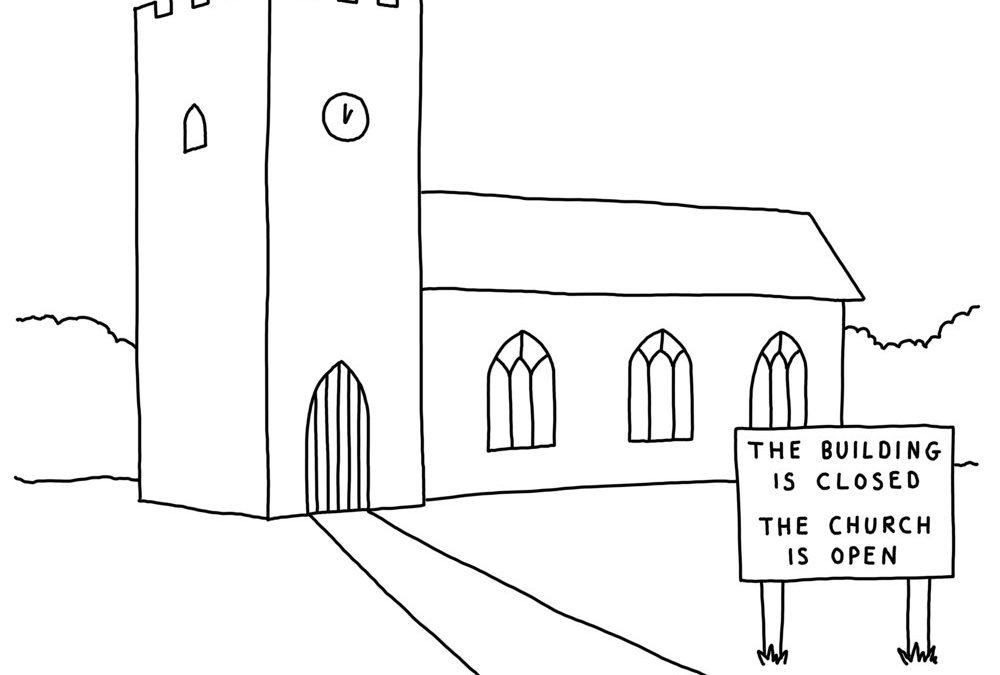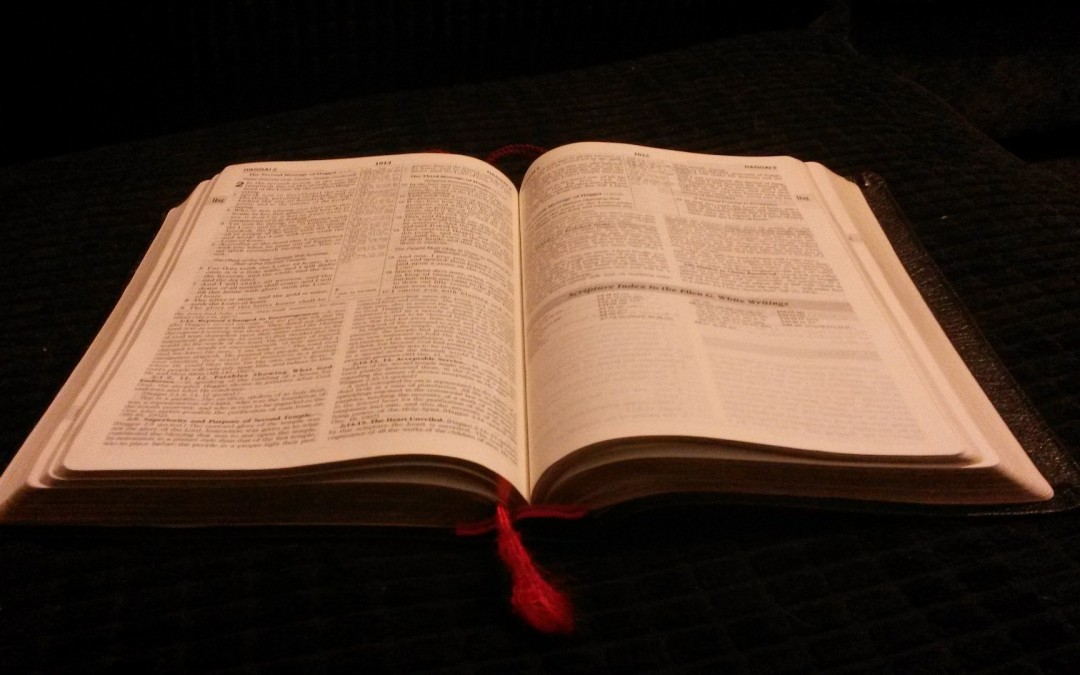
by church news | Mar 28, 2020 | Sermons
Ezekiel 37: 1014, Romans 8: 6-11, John 111-45
Another Sunday into the
Covid 19 crisis, and another cartoon to start this week’s sermon, with thanks
to Dave Walker for making this available, free, to all.
I cut the grass yesterday
– I wouldn’t dignify it with the soubriquet “lawn”, as it has been permanently
shaped by a puppy who dug holes at will and who has created bare earthen
pathways across it in her constant pursuit of interloping foxes. It was a totally normal thing to do, to get
the lawnmower out and put some order into the garden as Spring starts to burst out
around us. And yet it was not a normal
day at all. Conversations with people
passing by happened at a great distance.
Barely any cars could be heard, and the silence in the sky from absent
airplanes is still slightly strange, if a little wonderful on the birdsong
front.
Everything appears normal,
but it isn’t. Our lives are
circumscribed by Government advice.
Normal human contact has been shrunk.
Our homes are more lived in than for many years, now, and there appears
to be no end in sight. The churches are
locked, bolted up, unavailable. Our
normal way of worship has been put on hold.
Prayer has become personal and internalised, Bible reading a solitary
activity.
But as Dave Walker’s
simple but effective cartoon states, the Church is very much open. We continue to worship our God, we continue
to rejoice in our Lord and Saviour, Jesus Christ. We are still powered by the Holy Spirit to
reach out to others in love and care, to offer of ourselves what we can so that
others can enjoy the fulness of life that God offers us in Christ.
Two out of our three
readings for this Sunday are downright strange, too. It is not normal to visit a valley full of
bones and to see them return to their full human form. It is not normal for Jesus to delay visiting
a sick person, so that he dies. It is not
normal for Jesus to talk theology with a grieving sister. It is not normal for Jesus to raise his
friend Lazarus from death to life. But
it is normal for Jesus to weep with Mary, it is normal for Jesus to command
life to appear. It is normal for Jesus
to cast off from Lazarus the shackles of illness and despair and replace them
with joy and wholeness.
In these difficult,
abnormal times, let us hold on to the normality that God has created, that
Jesus has restored, that the Holy Spirit empowers. God’s amazing, self-giving love brings life
and joy, health and hope. Jesus Christ,
by his life, death and resurrection, has brought us all back to a normal
relationship with our loving God, and has demonstrated how to be fully
human. God’s Holy Spirit is in us all
the time to guide us in our choices and to alert us to the needs we will
encounter and how we can be part of their solution.
Let us, through this
abnormal time, explore what being fully human really means. Look at the example of Jesus, and see how he
behaves. He gets tired and angry,
emotional and joyful. He exposes people’s
hidden motivations, both bad and good, and draws them on to a truthful way of
living. He understands suffering and
anxiety, as he went through both, in extreme circumstances. He knows what it is like to live under
circumscribed laws, as the Romans ran Israel during his time, and there were
very strict rules on where you could travel, how you could work, and with whom
you could associate. The Romans were
very good at locking down whole towns or villages, in a way that would make our
current restrictions look very lax.
We have a God who
understands what we are going through, who knows the human heart and how it
reacts to joy and pain. We have a God
who loves us through those times, walks with us, supports us and casts off our
shackles and leads us into fulness of life.
May God give us grace to
use this time to grow as his children, to learn to love in new ways, to care in
new ways, to share our joys and sorrows in new ways. And may we have confidence in our loving God,
to sustain and protect us all the days of our life, to his eternal praise and
glory. Amen
Fr Peter 28.3.2020

by church news | Mar 28, 2020 | Front Page
Mary Noyes has recorded three great videos for the following songs
Whole world in his hand
Father God
Magic Penny
Please view and sing along!!
[cincopa AYDAjoeNgZxE]

by church news | Mar 28, 2020 | Front Page
At 10.00 on Sunday, click on the following link:
https://equinix.zoom.us/j/4354287638
Put in the name(s) of your children.
We will say hello, create a prayer then, finish with coffee and
biscuits.

by church news | Mar 28, 2020 | Front Page
“ Out of the strong came forth
sweetness.” The saying that is on tins of Lyle’s Golden Syrup.
The saying as I am sure most of you
will know is borrowed from the Book of Judges and the story of Samson, another
good tale well worth returning to!
Why do I mention it here, you may
ask? Well, last night at 8pm from all around our neighbouring flats
people, young and old, came out of their homes on to their balconies to clap
for all those who are working for us in the National Health and elsewhere.
This I know was repeated throughout London and the rest of the country,
as has happened in many other countries across Europe.
Out of the strength of dedication of
these workers, who are literally putting their own wellbeing on the line
on a daily bases, came this outpouring of love and thanks
and ‘sweetness’ for what they are all doing for each and very one of us.
Paul wrote at the end of
1Corinthians 13, “Meanwhile these three remain: faith, hope, and love; and
the greatest of these is love.”
If there was ever a greater time for
faith, hope and love, then certainly that time is now and the one word I would
add to those three is ‘thanks’, thanks as was shown last night to those
who battle on against all the odds.
This prayer was quoted by King
George VI in his Christmas Day broadcast of 1939.
“I said to the man who stood at the
gate of the year: ’Give me a light that I may tread safely into the unknown.’
And he replied: ‘Go out into the darkness and put your hand into the
hand of God. That shall be better than a light and safer than a known way.’
Amen.
Michael Tonkin
27.3.20

by church news | Mar 27, 2020 | Front Page
Section 2: Romans 8: 6-11
To set the mind on the
flesh is death, but to set the mind on the Spirit is life and peace. For this reason the mind that is set on the
flesh is hostile to God; it does not submit to God’s law – indeed it cannot,
and those who are in the flesh cannot please God. But you are not in the flesh; you are in the Spirit,
since the Spirit of God dwells in you.
Anyone who does not have the Spirit of Christ does not belong to
him. But if Christ is in you, though the
body is dead because of sin, the Spirit is life because of the
righteousness. If the Spirit of him who
raised Jesus from the dead dwells in you, he who raised Christ from the dead
will give life to your mortal bodies through his Spirit that dwells in you.
Prayer: Loving God, open your word to us now. Help us to read, to understand and to apply
all that you are saying to us. Amen
Read the passage through
twice.
Background
The Apostle Paul writes
this letter to a new church in Rome, to a group of people he has not met
before. Reports have reached him of
their faith, their pattern of worship and some of the issues that are troubling
them, so he seeks to address these matters in his missive. The majority of the church in Rome are
Gentiles, but there are some Jews among them, who will be more versed in the
Old Testament than their Gentile brothers and sisters. The Gentiles have converted from a
polytheistic practice with strong Stoic overtones to the worship of one
invisible God, made manifest in his son Jesus Christ, in the fulness of the
Holy Spirit. They have to make huge
changes to the way that they think of God, of right and wrong, of this life and
the next.
Some definitions:
- “Flesh” means
human existence in its basic form
- “Spirit” means
the indwelling power of God, alive in the world to all believers after
Pentecost
- “Mortal body”
means our current flesh and blood
“To set the mind on the
flesh…” what exactly does that mean?
and
“To set the mind on the
Spirit…” is equally obscure.
What about “those who are
in the flesh…” – what is Paul driving at?
There are two states in
which a human being can find themselves, Paul argues. There is the natural state, and there is the
spiritual state. The natural state does
not know God and cannot attain to the standards set by God, even if it tries
really hard. God is holy, and the natural state is sinful and can never match
God’s holiness. If that is the case,
then God has to reach out to us, to change our natural state into a spiritual
state that can live in God’s holiness and express God’s love in word and action.
God’s initiative to
transform natural humanity into spiritual humanity comes in the form of Jesus
Christ, God himself, but fully human, a natural human being who can match the
standards of a holy God. By the gift of
the Holy Spirit at Pentecost and at baptism, our natural humanity is changed –
what Paul describes as “Christ in you” – so that mortality is redeemed.
Our mortality does not
cease with our spiritual rebirth, but it is not going to drag us down to
despair, Paul insists. The power at work
in the Holy Spirit is the same power that created the world (cf Ezekiel 37) and
the same power that raised Jesus from the dead, so that now we have both
“Christ in us” and “his Spirit that dwells in us” – we have God in us, doubly –
Christ’s life, and the Spirit’s power.
This is heading towards
Paul’s great hymn to the love of God (and one of his most fantatastic lists!)
with which this chapter finishes, “For I am convinced that neither death nor
life, nor angels, nor rulers, nor things present, nor things to come, nor
powers, nor height, nor depth, nor anything else in all creation, will be able
to separate us from the love of God in Christ Jesus our Lord.” (Romans 8:
34-35)
Some questions:
- How conscious are
we of being “in the flesh”? Is sin a bothersome burden, every day?
- How conscious are
we of being “in the Spirit”? Are we
aware of the presence of God in our life, every day? If so, how?
- Are there times
when we feel “hostile to God”? When and
why?
- Do we feel that
our body is alive with the righteousness of Christ and the indwelling power of
the Holy Spirit? If yes, when? If not, why not?
- How helpful do
you think this passage was to the Roman church when it was first read to
them? Do you think they understood
it? If not, how many times did they have
to repeat this so that they could get their minds around it?
- What has this
text done to your understanding of God?
- Has this text
helped you to pray any more easily?
- Do you feel you
could now explain this text to someone who had read it for the first time?
- In church, we
would finish reading this passage with the words, “This is the Word of the
Lord”, and we would respond, “Thanks be to God.” Can you make that response freely and with a
positive frame of mind, now?
Reread the passage, out loud if possible
To review:
- Our natural state
cannot attain to the holiness of God
- God reaches out
to us in Christ, in the power of the Holy Spirit, to give us his holy life
- Wwhatever the
every day failings of our humanity, we are fully alive in the Spirit if we allow
that Spirit to work God’s righteousness in us
Prayer: Loving God, thank you for reaching out to us in
love. Help us to respond in equal
measure, to allow your Holy Spirit to keep us fully alive, that we may
demonstrate your love in our words and deeds and worship you every more
deeply. Amen





